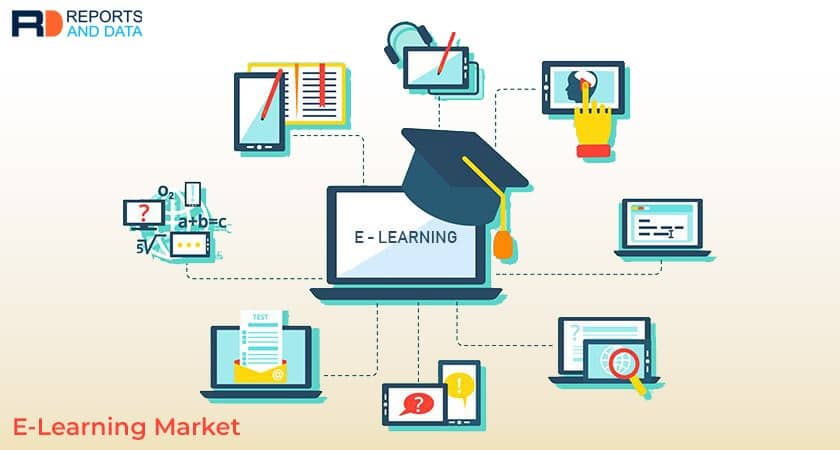E-learning, or electronic learning, refers to acquiring knowledge ‒ education, and training ‒ through digital resources to access the educational curriculum outside the traditional classroom. E-learning can also be defined as a learning system based on conventional teaching but assisted through digital devices. E-learning has completed altered the way learning is imparted to students. e-Learning has become powerful, impactful, and convenient, and regardless of the consumer being an expert or beginner, the popularity of eLearning has grown exponentially over the last decade. In the modern “always-on” world, eLearning confers extensive benefits to both learners and organizations.
Edtech mends the bridges between educators and students, assisting them in tackling obstacles that the current landscape presents. The concept of e-learning has been proliferating for the last decade, with extensive adoption of digital devices across the academic and corporate sectors. e-Learning has enabled students to access educational content anytime and anywhere and has supported employers to enhance their employees’ skills. The e-learning market is gaining rapid momentum because today’s learners want mobile, self-paced, personalized, and relevant content at their fingertips at the end of the day.
Significant Benefits of eLearning and Why it is so Popular
- Online learning caters to everyone’s requirements and is well-tailored for everyone. Digitalization has paved the way for remarkable alterations in how the content is assessed, understood, analyzed, and distributed. Online learning can be commenced at the convenience and comfort of the people.
- Unlike traditional classrooms, online learning provides unlimited access to the content at any given time. e-Learning allows users to attend lectures whenever they want with ease and comfort.
- A chief advantage of digital learning is the enhanced synchronization of the user with modern learning solutions, which allows the users to access up-to-date content whenever, wherever.
- e-Learning provides a rapid delivery of lessons and is cost-efficient as compared to conventional learning. This cost-effectiveness enhances the organization’s profitability as it reduces the time and expenses related to course and training.
- e-Learning deploys a paperless approach to learning, which means it also positively impacts the environment to a superior extent. According to a survey, online learning programs effectively consumed nearly 90% less power and generated 80% lesser carbon emissions than the traditional way of learning. This makes e-Learning extremely eco-friendly and assures its rapid adoption.
These points convey why eLearning is so popular among students and appreciated across the world.
COVID-19 Pandemic: A Booster Dose for e-Learning Platforms
The COVID-19 pandemic, the onset of which was recorded in late 2019, spread like wildfire globally, compelling countries to go under lockdowns. These lockdowns forced the global education system to shift its base to online platforms. The pandemic can be considered a blessing-in-disguise for the market. It has seen a massive boost in growth due to the rapid adoption of digital platforms across academia, which offer a broad spectrum of certified and university-affiliated courses for students.
According to a statistical report released in April 2020, nearly 1.2 billion children were affected by schools’ closure across 186 countries. The pandemic changed how the education system worked and raised questions about whether the situation was permanent or would change post-pandemic. However, even before the pandemic struck,
With the currently unfolding pandemic, the eLearning and edtech market witnessed a higher growth rate and adoption, with global edtech investments in 2019 touching a valuation of USD 18.67 billion. Whether it was apps teaching languages, online tutor sessions, or video conferencing tools, there’s been a massive surge in the use of edtech platforms since the pandemic struck the world.
Education Sector’s Response to the Rise of the e-Learning Market
To cater to the surging demand, several edtech platforms, such as edtech decacorn BYJU’s, Bangalore-based edtech firm, and the most-valued edtech firm across the world, offered free access to their edtech services. According to the COO of BYJU’s, since the platform offered free access in the early months of the pandemic, BYJU’s saw a 200% surge in new subscribers.
Tencent Classroom was extensively used in February after the Chinese authorities encouraged millions of full-time students to carry on with their studies via online classrooms. In March 2020, the World Economic Forum reported that approximately 73,000 K-12 students enrolled in online lectures in the Tencent K-12 Online School.
Lark, a Singaporean collaborative suite, designed by ByteDance, offered educational staff and students unlimited video-conferencing minutes, auto-translation capacity, and the ability to real-time co-edit project work. Lark upgraded its global server system to ensure safe and efficient connectivity.
The Future of the e-Learning Market
The pandemic has also boosted the adoption of e-Learning solutions across various industry verticals such as government, healthcare, and aerospace sector. For instance, the Australian Government Department of Health deployed online training modules to the frontline healthcare workers to educate them about curbing the spread of coronavirus infection. The WHO also provided digital learning and training about virus prevention, control, and hygiene, to healthcare practitioners and administrators.
While many people believe the rapid shift to e-learning with a background of issues such as limited training, inadequate preparation, and inefficient bandwidth, will lead to a poor experience that will limit growth, some people believe the novel hybrid education model will bring about a revolution in the education sector. For instance, the course on the science of coronavirus, launched by The Imperial College of London on Coursera saw the highest enrollments in 2020.
More and more organizations are working towards reducing their carbon footprint as a vital part of their corporate responsibility strategy. e-Learning is a highly effective method for lowering the environmental impact as it offers a sustainable alternative to traditional paper-based learning.

